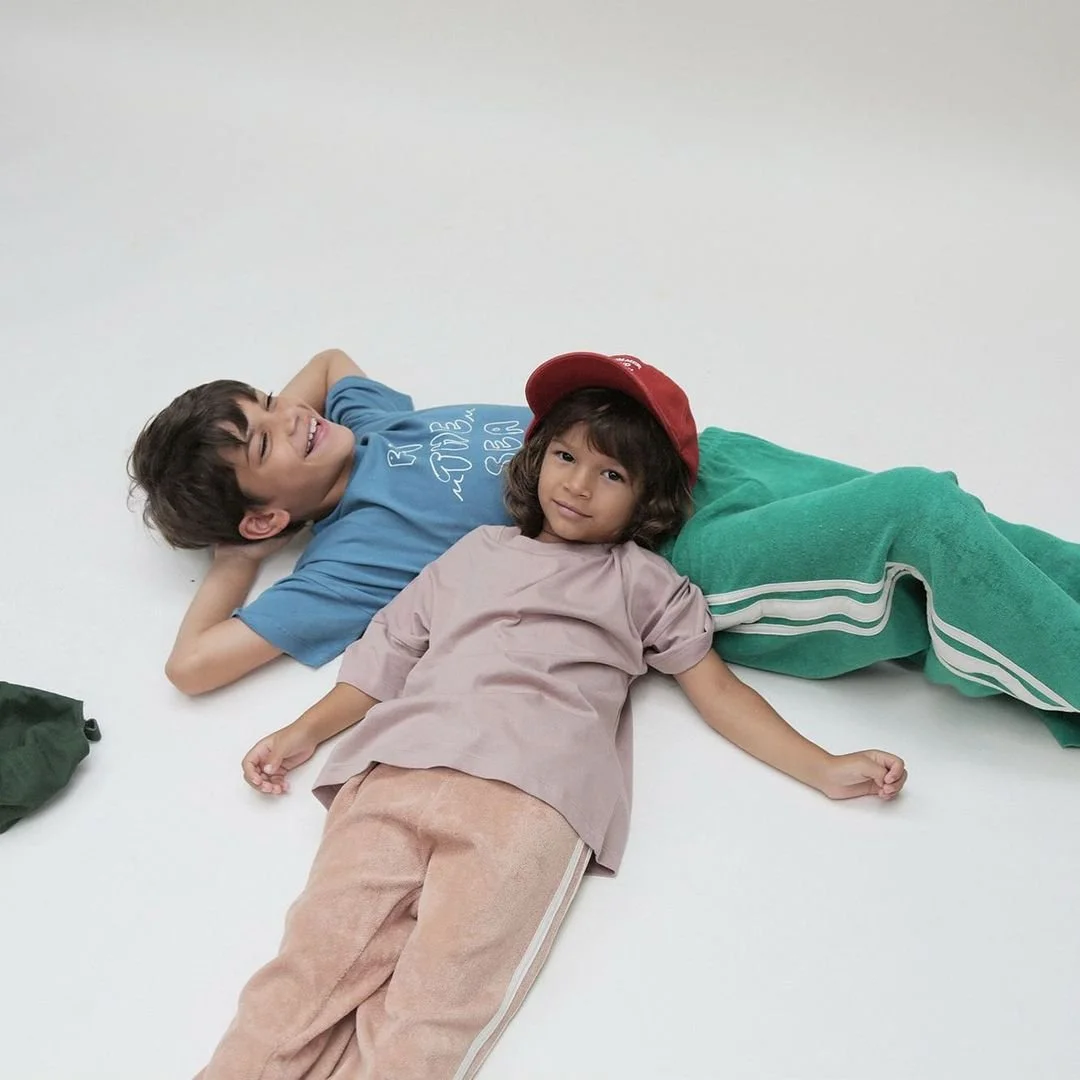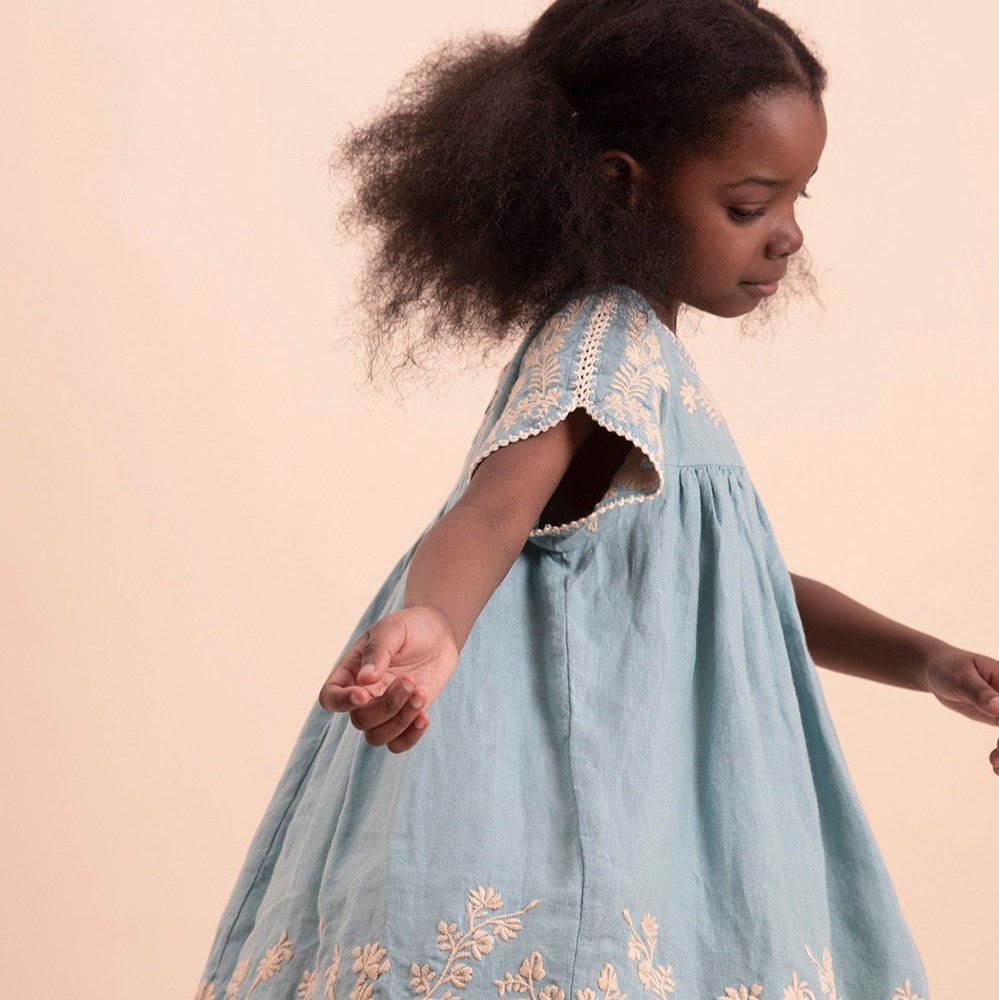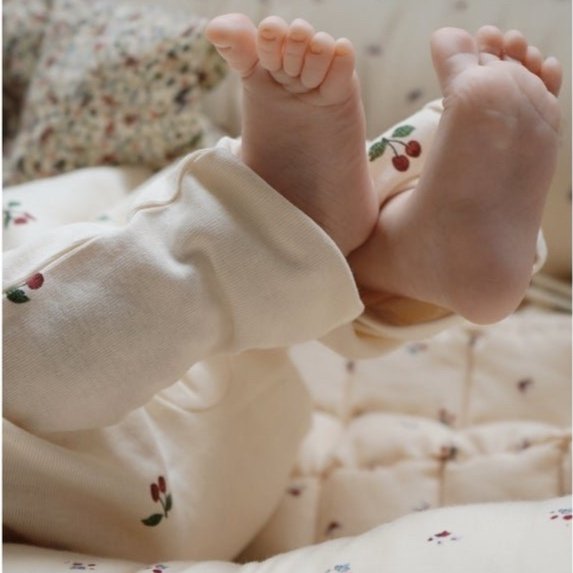Sustainability Q+A with Chasing Windmills
Sarah & JP Box
INTERVIEW WITH JP & SARAH BOX
CO-FOUNDERS CHASING WINDMILLS
WHAT CAN YOU SHARE ABOUT THE HISTORY AND ETHOS OF CHASING WINDMILLS?
Before we launched Chasing Windmills, we drafted a vision statement to help guide our path. We wanted to be more than a company just produces a good for consumption. We wanted to connect genuinely with parents who value beautiful simplicity for their children, who wish to establish a connection with Mother Nature from an early age, and who appreciate the incredible properties of merino wool.
Here is our vision statement:
We are makers of merino wool children's wear. But our vision does not end there. We will never be content merely to produce a good for consumption. We succeed when we capture the adventurous spirit of childhood through the natural goodness of merino wool.
At its core, Chasing Windmills is for those who chase the impossible dream.
For those who embrace idealism in the face of cynicism.
For those who understand that small acts, done with great love, sustain a beautiful world.
For those who feel compelled to live the life they love.
For those who believe that a conscious company must care for, not just its profits, but the lives it touches and the environment it graces.
And so, Chasing Windmills exists. It is the embodiment of hopes, dreams, and aspirations.
For us to achieve our vision, Chasing Windmills must live by its values and prove profitability.
Profits, however, are not the ends, but rather the means by which Chasing Windmills may share its vision and, in turn, inspire its supporters to pursue virtue, meaning, and happiness in their own lives.
Above all, Chasing Windmills will always be dedicated to the adventurous idealist.
WHERE ARE YOU LOCATED?
We are based in Denver, Colorado.
WHERE ARE THE COLLECTIONS PRODUCED?
The short answer is: the sheep are primarily in New Zealand, and the garments are made in North Carolina at a worker-owned factory.
Our farm-to-garment story starts with merino sheep roaming mountainous meadows in New Zealand and Australia. The merino wool from these ranches is certified by the Responsible Wool Standard (known as “RWS”). RWS is a voluntary global standard, subject to independent auditing, that promotes the “welfare of sheep and the land they graze on.” Their mission is to “provide the industry with a tool to recognize the best practices of farmers; ensuring that wool comes from farms with a progressive approach to managing their land, and from sheep that have been treated responsibly.”
Our fabric suppliers work with their satellite factories in Vietnam and Thailand to transform the shorn merino fleeces into the super soft fabric used in our collections. Importantly, our fabric suppliers are Bluesign Systems Partners, evidencing their commitment to ecologically sound principles and care for the environment, the workers in the supply chain, and ultimately the wearer.
Since 2016, those merino fabric rolls have gone to our worker-owned manufacturing partner in North Carolina to expertly prepare the finished garments. By spreading opportunity through needle and thread, our manufacturing partner is working to revitalize the once-booming Carolinas Textile District.
WHAT WAS YOU PROCESS IN SELECTING YOUR FACTORIES AND HOW DO YOU ENSURE YOUR MANUFACTURERS ARE MEETING BEST ETHICAL PRACTICES? ARE YOU ABLE TO CLOSELY MONITOR YOUR PRODUCTION?
We obsess about this question step-by-step, beginning with the ranches that are home to the merino sheep. We wanted to ensure the ethical and humane treatment of these beautiful animals, including (1) never partnering with a ranch that mulesed its sheep (a painful and unnecessary surgical procedure), and (2) ensuring the five freedoms of happy and healthy sheep. These freedoms are:
Freedom from thirst, hunger and malnutrition;
Access to adequate comfort and shelter from adverse weather conditions;
The ability to display normal patterns of behavior (i.e., free range);
To be handled in a manner which minimizes pain or distress to the animal; and
Protection from or rapid diagnosis of, any significant injury or disease.
This led us to a collection with merino certified by ZQ Merino, the Global Merino Quality Assurance Program, and the Responsible Wool Standard—all of which employ independent auditing and require strict animal welfare, environmental, and economic sustainability standards.
As previously noted, we then looked for and found a Bluesign Systems Partner in our fabric supplier to transform the shorn fleeces into our rolls of fabric. The apparel industry can, unfortunately, be a dirty one, and so we wanted to align ourselves with people committed to reversing that trend. In addition to caring for the environment, our fabric supplier from day one adhered to a Corporate Social Responsibility and Social Code to protect worker rights, including freedom of association and collective bargaining; fair wages and benefits; and safe and healthy work environments.
With our manufacturing being done in North Carolina, we are in constant communication with our production team. As noted previously, we selected our manufacturing team not only because of their tremendous skill and attention to detail, but because we also love their vision. They believe in their workers, so much so that after a vetting process, their workers have the opportunity to become owners of the company — quite literally spreading opportunity through needle and thread. Ultimately the workers themselves and their families are the beneficiaries of the success and growth of their business.
WHAT KIND OF FABRICS DO YOU MOST USE? ARE YOUR FABRICS GOTS CERTIFIED ORGANIC?
We use 100% merino wool, a super soft fabric engineered by Mother Nature :). Merino wool is a natural renewable fiber that is super soft, wicks away moisture, helps regulate body temperature, and resists odor. A lot of synthetic fibers try to mimic merino wool, but in our opinion nothing compares to the technical benefits and natural soul of merino.
Our merino ranches are not technically organic, although the ranches are audited to ensure biodiverse soils and sustainable ranching practices. However, if a sheep becomes sick, for example, a merino rancher may give the sheep antibiotics to help it recover—which is not strictly an organic practice.
HOW DO YOU SELECT THE FABRICS YOU USE AND WHERE DO THEY COME FROM?
Our collection is 100% merino. Over the years, we’ve met some pretty incredible folks, including Philip and Kate Rive, managers of the Cecil Peak Station in the Remarkables mountain range in New Zealand. You can read up on them HERE.
Our go-to-fabric would be a 100% merino, 18.9 microns, 195gsm. Yes, we went technical there! To break it down, 18.9 microns means that each merino fiber is less than nineteen-millionths of a meter in diameter (or about one-third as thick as the hair on your head). With that fineness comes next-to-skin comfort. This isn’t the scratchy wool sweater from your childhood! It’s super soft :) And the 195gsm translates to a fabric weight that works great as a base layer and as a pajama!
CAN YOU PLEASE TELL US ABOUT HOW YOUR FABRICS ARE DYED?
The fabric dyeing is handled by our Bluesign Systems Partner fabric suppliers. They take care to ensure that all dyes are safe and healthy for the environment, the workers in the supply chain, and ultimately the wearer.
WHAT DO YOU DO WITH YOUR OVERSTOCK OF MATERIALS, DAMAGED ITEMS AND FABRIC SCRAPS?
Our manufacturer saves and sends to us the most sizable fabric scraps from the cutting room. We then separate those scraps into uniform sizes and offer merino scrap bundles to our customers for crafting and mending projects. For the scrap pieces that are too small to be usable, our manufacturer sells those scraps back to a South Carolina based company that uses them for fiber fill.
A few years ago, we also partnered with Hazel Village, a doll and stuffed animal maker, to release matching long johns for the woodland friends in their collection. We sent them some of our usable scraps to create the mini long johns! It’s fun for our own kiddos to go to sleep at night in their merino long johns snuggled up with a matching Hazel Village friend!
As for damaged items, we usually try to find a home for them. Whether it’s an imperfection in the sewing or a small hole in the fabric, we recognize that a few garments here and there will not be perfect but that doesn’t mean they should end up in a landfill! So, we’ve started doing an annual perfectly imperfect sale for those garments with slight imperfections and for any sample garments too.
Finally, for overstock items, we’ve donated to a local Denver non-profit children’s hospital as well as organizations that advocate for migrant children.
CAN YOU PLEASE TELL US ABOUT YOUR PACKAGING FOR SHIPMENTS TO CUSTOMERS?
We’ve opted for very simple packaging — we like to think beautifully simple :) For example, we roll up our long johns and tie them with a simple Italian cotton ribbon. Our crib sheets are the only item that comes in more substantial packaging, and for that, it’s just a lightweight box made from 100% recycled paper. We really believe in letting the merino speak for itself, and so we don’t see any need to “sell” the item through the packaging.
For our mailers, we’ve partnered with a fellow Colorado company called EcoEnclose. Our poly mailers are a lightweight 100% recycled and recyclable plastic, and our cardboard boxes are made from 100% recycled paper products- no virgin materials are used.
We’ve debated using a rigid paper polymailer or a plant-based plastic mailer, but we’ve stuck with 100% recycled plastic for three main reasons. First, the plastic mailers are lighter than paper, and therefore the carbon footprint in shipping is smaller. Second, we see a need to support the recycling and re-using of the plastic that already exists, creating a demand for the recycled plastic market. And, third, we like the plant-based plastics but it’s hard to find post-consumer plant-based plastics (meaning that virgin materials are often used in their manufacturing). And one bonus reason- our mailers come with a dual adhesive strip, allowing easy reuse prior to being recycled.
DO YOU USE INDIVIDUAL BAGS FOR INDIVIDUAL ITEMS WHEN YOU SHIP TO RETAILERS? IF YES, ARE THEY RECYCLED AND/OR COMPOSTABLE?
When we ship to our limited amount of retail partners, for storage purposes we ship our garment in 100% recycled bags. They are made from 100% recycled content and are recyclable .
DO YOU USE RECYCLED PAPER FOR YOUR HANG TAGS, POSTCARDS AND LOOKBOOKS?
We don’t produce postcards or lookbooks (except in digital formats). We source our hang tags from a North Carolina company, and currently the hang tags stock is partially recycled. We are currently looking into moving to 100% recycled stock for our hang tags.
DO YOU WANT TO SHARE ANYTHING ELSE WITH OUR READERS ON YOUR EFFORTS IN SUSTAINABILITY AND ETHICAL PRACTICES?
Just two last items come to find.
First, mindful of our eco-footprint, we purchase carbon offsets annually to ensure that renewable energy projects and methane-capture projects offset our environmental impact from our home office and our shipping worldwide. Chasing Windmills was born out of respect for Mother Nature's goodness, and our commitment to minimizing the carbon footprint of our business naturally follows
Second, we design our apparel to be gender-neutral and outlast the seasons (as well as the trends)—meaning that our apparel can be passed down from child to child. And generally, when we re-design an item, it’s to extend its lifetime. So, for example, last year we debuted reinforced knees in our long johns. With kids playing on the ground as much as they do, we discovered that the knees were usually the first point to wear out. By reinforcing the knees, we’ve doubled the lifespan on that particular garment. For us, it’s just another small way of respecting nature’s resources.
BACK TO BRAND PROFILE
Last updated November 2021










